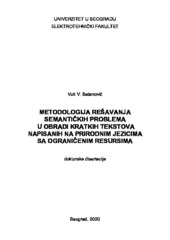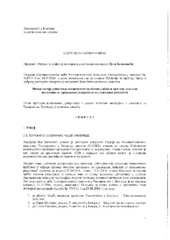| dc.contributor.advisor | Nikolić, Boško | |
| dc.contributor.other | Cvetanović, Miloš | |
| dc.contributor.other | Bojić, Dragan | |
| dc.contributor.other | Ševarac, Zoran | |
| dc.contributor.other | Drašković, Dražen | |
| dc.creator | Batanović, Vuk | |
| dc.date.accessioned | 2021-02-09T15:14:43Z | |
| dc.date.available | 2021-02-09T15:14:43Z | |
| dc.date.issued | 2020-12-23 | |
| dc.identifier.uri | http://eteze.bg.ac.rs/application/showtheses?thesesId=7878 | |
| dc.identifier.uri | https://fedorabg.bg.ac.rs/fedora/get/o:23189/bdef:Content/download | |
| dc.identifier.uri | http://vbs.rs/scripts/cobiss?command=DISPLAY&base=70036&RID=31036425 | |
| dc.identifier.uri | https://nardus.mpn.gov.rs/handle/123456789/17783 | |
| dc.description.abstract | Statistički pristupi obradi prirodnih jezika tipično zahtevaju značajne količine anotiranih
podataka, a često i različite pomoćne jezičke alate, što ograničava njihovu primenu u resursno
ograničenim situacijama. U ovoj disertaciji predstavljena je metodologija razvoja statističkih rešenja
u semantičkoj obradi prirodnih jezika sa ograničenim resursima. Ovakvi jezici se odlikuju ne samo
limitiranim brojem postojećih jezičkih resursa, već i ograničenim mogućnostima za razvoj novih
skupova podataka i namenskih alata i algoritama. Predložena metodologija je usredsređena na kratke
tekstove zbog njihove rasprostranjenosti u digitalnoj komunikaciji i zbog veće složenosti njihove
semantičke obrade.
Metodologija obuhvata sve faze izrade statističkih rešenja, od prikupljanja tekstualnog sadržaja,
preko anotacije podataka, do formulisanja, obučavanja i evaluacije modela mašinskog učenja. Njena
upotreba je detaljno ilustrovana na dva semantička problema – analizi sentimenta i određivanju
semantičke sličnosti. Kao primer jezika sa ograničenim resursima korišćen je srpski jezik, ali se
predložena metodologija može primeniti i na druge jezike iz ove kategorije.
Pored opšte metodologije, u doprinose ove disertacije spada razvoj novog, fleksibilnog sistema
označavanja sentimenta kratkih tekstova, nove metrike za utvrđivanje ekonomičnosti anotacije, kao
i nekoliko novih modela za određivanje semantičke sličnosti kratkih tekstova. Rezultati disertacije
uključuju i kreiranje prvih javno dostupnih anotiranih skupova podataka za probleme analize
sentimenta i određivanja semantičke sličnosti kratkih tekstova na srpskom jeziku, razvoj i evaluaciju
većeg broja modela na ovim problemima, i prvu komparativnu evaluaciju većeg broja alata za
morfološku normalizaciju na kratkim tekstovima na srpskom jeziku. | sr |
| dc.description.abstract | Statistical approaches to natural language processing typically require considerable
amounts of labeled data, and often various auxiliary language tools as well, limiting their applicability
in resource-limited settings. This thesis presents a methodology for developing statistical solutions in
the semantic processing of natural languages with limited resources. In these languages, not only are
existing language resources limited, but so are the capabilities for developing new datasets and
dedicated tools and algorithms. The proposed methodology focuses on short texts due to their
prevalence in digital communication, as well as the greater complexity regarding their semantic
processing.
The methodology encompasses all phases in the creation of statistical solutions, from the collection
of textual content, to data annotation, to the formulation, training, and evaluation of machine learning
models. Its use is illustrated in detail on two semantic tasks – sentiment analysis and semantic textual
similarity. The Serbian language is utilized as an example of a language with limited resources, but
the proposed methodology can also be applied to other languages in this category.
In addition to the general methodology, the contributions of this thesis consist of the development of
a new, flexible short-text sentiment annotation system, a new annotation cost-effectiveness metric, as
well as several new semantic textual similarity models. The thesis results also include the creation of
the first publicly available annotated datasets of short texts in Serbian for the tasks of sentiment
analysis and semantic textual similarity, the development and evaluation of numerous models on
these tasks, and the first comparative evaluation of multiple morphological normalization tools on
short texts in Serbian. | en |
| dc.format | application/pdf | |
| dc.language | sr | |
| dc.publisher | Универзитет у Београду, Електротехнички факултет | sr |
| dc.rights | openAccess | en |
| dc.rights.uri | https://creativecommons.org/licenses/by-nc-sa/4.0/ | |
| dc.source | Универзитет у Београду | sr |
| dc.subject | obrada prirodnih jezika | sr |
| dc.subject | natural language processing | en |
| dc.subject | računarska lingvistika | sr |
| dc.subject | semantička sličnost tekstova | sr |
| dc.subject | analiza sentimenta | sr |
| dc.subject | morfološka normalizacija | sr |
| dc.subject | lingvistička anotacija | sr |
| dc.subject | mašinsko učenje | sr |
| dc.subject | computational linguistics | en |
| dc.subject | semantic textual similarity | en |
| dc.subject | morphological normalization | en |
| dc.subject | linguistic annotation | en |
| dc.subject | machine learning | en |
| dc.subject | sentiment analysis | en |
| dc.title | Metodologija rešavanja semantičkih problema u obradi kratkih tekstova napisanih na prirodnim jezicima sa ograničenim resursima | sr |
| dc.type | doctoralThesis | en |
| dc.rights.license | BY-NC-SA | |
| dcterms.abstract | Николић, Бошко; Шеварац, Зоран; Бојић, Драган; Драшковић, Дражен; Цветановић, Милош; Батановић, Вук; Методологија решавања семантичких проблема у обради кратких текстова написаних на природним језицима са ограниченим ресурсима; Методологија решавања семантичких проблема у обради кратких текстова написаних на природним језицима са ограниченим ресурсима; | |
| dc.identifier.fulltext | https://nardus.mpn.gov.rs/bitstream/id/67921/IzvestajKomisije23600.pdf | |
| dc.identifier.fulltext | https://nardus.mpn.gov.rs/bitstream/id/67920/Disertacija.pdf | |
| dc.identifier.rcub | https://hdl.handle.net/21.15107/rcub_nardus_17783 | |



